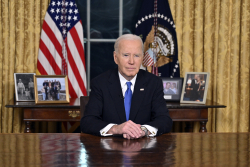The Trump administration is halting live cattle, horse, and bison imports due to the spread of a flesh-eating pest that is threatening to cross the southern border.
U.S. Department of Agriculture (USDA) Secretary Brooke Rollins announced Sunday the suspension of those imports through the nation’s ports of entry along the southern border as the New World Screwworm (NWS) spreads northward through Mexico.
The agency said the suspension is taking immediate effect because the pest has been detected approximately 700 miles from the U.S. border.
The agency said that U.S. and Mexican officials are working to interdict and eradicate the pest in Mexico but “despite these efforts and the economic impact on both countries due to this action, there has been unacceptable northward advancement of NWS and additional action must be taken to slow the northern progression of this deadly parasitic fly.”
Therefore, the USDA Animal Plant Health Inspection Service (APHIS) along with Customs and Border Protection (CBP) are restricting those imports, and it will be on a month-to-month basis “until a significant window of containment is achieved.”
Rollins explained, “The protection of our animals and safety of our nation’s food supply is a national security issue of the utmost importance. Once we see increased surveillance and eradication efforts, and the positive results of those actions, we remain committed to opening the border for livestock trade. This is not about politics or punishment of Mexico, rather it is about food and animal safety.”
The USDA’s website said the agency eradicated NWS from the U.S. in 1966 via a sterile insect technique, but there is always a risk of it being reintroduced:
The name screwworm refers to the maggots’ feeding behavior as they burrow (screw) into the wound, feeding as they go like a screw being driven into wood. Maggots cause extensive damage by tearing at the hosts’ tissue with sharp mouth hooks. The wound can become larger and deepen as more maggots hatch and feed on living tissue. As a result, NWS can cause serious, often deadly damage to the animal.
National Cattlemen’s Beef Association CEO Colin Woodall said the suspension of imports will affect the nation’s cattle industry, but it was of the utmost importance to ensure there is protection from NWS, Brownfield Ag News reported on Sunday.
Woodall also said the Mexican Government had not taken appropriate actions to eradicate the pest. The article continued:
Mexico recently agreed to eliminate restrictions that have limited the USDA’s efforts to combat the pest. Woodall tells Brownfield it was too little, too late. “Because the phytosanitary line, which is basically the red line that was drawn in the Isthmus of Mexico, that narrow part of Mexico, that was the area they were trying to hold it,” he says. “The New World screw worm flies have since broken through that barrier.”
According to Woodall, Mexico has essentially opened a “superhighway to the United States, especially looking at Texas.”
In a post on its website, the Texas and Southwestern Cattle Raisers Association (TSCRA) said it agrees with the decision to close the border as the pest threatens the United States.
President Carl Ray Polk Jr. said the association takes the threat seriously and commends Rollins for making the decision even though it creates short-term challenges for cattle raisers.
“Cooperation from the Mexican government is essential, and this move sends a clear signal about the urgency of the situation. Our association has consistently supported a border closure if warranted, and while we continue to work toward a domestic sterile fly production facility, we are left to rely more heavily on ground-based containment efforts,” he added.
In a social media post on Sunday, Rollins said, “The last time this devastating pest invaded America, it took 30 years for our cattle industry to recover. This cannot happen again”:
Montana Stockgrower’s Association President Lesley Robinson on Monday pressed home the point that “food safety and food security is national security,” she told Western Ag Network. She expressed appreciation that Rollins made the decision to halt the imports due to NWS.
“We’ve had it before and we do not want it again, and I just appreciate that they are taking it as serious as they are,” she added:
The USDA’s press release noted NWS was reported in the U.S. in November and the agency shut down the border for live animal trade that month.
“In February 2025, USDA resumed imports after APHIS and Mexico agreed to and implemented a comprehensive pre-clearance inspection and treatment protocol to ensure safe movement and steps to mitigate the threat of NWS,” the agency said.
Now, authorities are releasing sterile flies while focusing on Southern Mexico and parts of Central America.
















